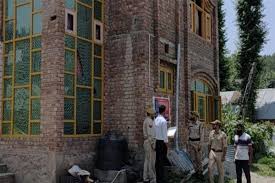The newly launched free bus service for women in Jammu and Kashmir has witnessed an overwhelming response, with over 3.5 lakh women availing the facility within just a week of its launch on April 1, 2025. This landmark initiative, flagged off by Chief Minister Omar Abdullah, is part of the government’s broader agenda to promote gender-inclusive mobility and empower women across the Union Territory. The scheme, which provides free ridership on government-operated electric and public buses, has already doubled daily ridership, with 40,000 to 50,000 women traveling regularly across more than 30 routes.
This initiative is not just a welfare measure; it is a transformative step toward empowering women by enhancing their mobility and independence. Women from both urban and rural areas are using the service to commute to schools, colleges, workplaces, and marketplaces. The scheme has particularly benefited working women and students who previously struggled with the financial burden of daily travel. “More than half of my salary was spent on transportation. Now I can save that money for essentials,” said a working woman from the outskirts of Srinagar.
The introduction of this service has also had a significant social impact. By providing safe and affordable transportation options, it has reduced women’s dependency on private or unsafe modes of travel. Officials noted that bus stops are now witnessing large turnouts during peak hours—8 to 10 AM, midday, and 4 to 6 PM—indicating the growing reliance on this service. The air-conditioned electric buses have been especially appreciated during the hot summer days, offering comfort and convenience to passengers.
Chief Minister Omar Abdullah emphasized the initiative’s role in fostering women’s empowerment during its launch at the Sher-i-Kashmir International Convention Center (SKICC). “This isn’t just about affordability; it’s about accessibility, safety, and creating an environment where women feel empowered to travel freely,” he said. The scheme also aligns with broader efforts to boost workforce participation among women by removing barriers to mobility and enabling greater access to education and employment opportunities.
The free bus service has also highlighted the potential of sustainable urban transport systems in addressing social challenges. With over 95 electric buses operating across Jammu and Kashmir under the Smart City initiative, this program marks a significant step toward eco-friendly public transport while addressing gender disparities in mobility. According to Smart City data accessed by officials, daily ridership on these buses has doubled since the scheme began, rising from around 20,000 passengers earlier to more than 40,000 now.
Beyond its immediate benefits, the initiative holds long-term implications for women’s empowerment in Jammu and Kashmir. By reducing financial constraints and ensuring safer travel options, it encourages greater participation of women in public life. This is particularly significant for students and young professionals who can now pursue education and career opportunities without worrying about transportation costs or safety concerns.
The government is also exploring ways to ensure the scheme’s sustainability through funding mechanisms and subsidies. Authorities are optimistic about its impact on social equity and economic growth in the region. “This initiative is a progressive step toward a safer, more inclusive, and economically empowered Jammu and Kashmir,” said an official involved in its implementation.
The free bus service for women is not just about providing transportation—it symbolizes freedom, independence, and empowerment for thousands of women across Jammu and Kashmir. By enabling them to move freely without financial or safety concerns, this initiative is paving the way for a more inclusive society where women can thrive both personally and professionally. As ridership continues to grow, so does the promise of a brighter future for women in the Union Territory—a future where mobility becomes a catalyst for empowerment and progress.







